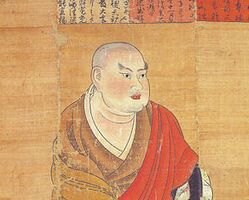Kuiji
| PersonType | Category:Classical Chinese Authors |
|---|---|
| MainNamePhon | Kuiji |
| MainNameTib | 窺基 |
| SortName | Kuiji |
| bio | Kuiji. (J. Kiki; K. Kyugi 窺基) (632-682). Scholar-monk of the Tang dynasty, commonly regarded as the founder of the Faxiang zong of Chinese Yogācāra Buddhism. Orphaned as a boy, Kuiji was ordained as a teenager and assigned to the imperial translation bureau in the Tang capital; there, he emerged as one of the principal disciples of Xuanzang, under whom he studied Sanskrit and Indian Buddhist abhidharma and Yogācāra scholasticism. He participated in Xuanzang's numerous translation projects and is closely associated with the redaction of the Cheng weishi lun, which included extensive selections from ten Indian commentaries. Kuiji played a crucial role in selecting and evaluating the various doctrinal positions that were to be summarized in the text. Kuiji subsequently wrote a series of lengthy commentaries on Dharmapāla's doctrinally conservative lineage of Vijñaptimātratā-Yogācāra philosophy. His elaborate and technical presentation of Yogācāra philosophy, which came to be designated pejoratively as Faxiang (Dharma Characteristics), contrasted markedly with the earlier Chinese Yogācāra school established by Paramārtha. Because he resided and eventually died at Daci’ensi, he is often known as Ci’en dashi (J. Jion daishi; K. Chaǔn taesa), the Great Master of Ci'en Monastery. Kuiji commentaries include the Chengweishi lun shuji and the Dasheng fayuan yilin zhang. (Source: "Kuiji." In The Princeton Dictionary of Buddhism, 450. Princeton University Press, 2014. http://www.jstor.org/stable/j.ctt46n41q.27.) |
| YearBirth | 632 |
| YearDeath | 682 |
| Other wikis |
If the page does not yet exist on the remote wiki, you can paste the tag |

